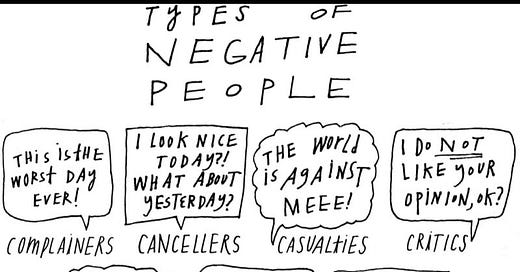Negative behaviors surround us so constantly that we grow usually with them.
As negativity is everywhere and there're different types of people around who adapt to different negative behaviours.
So there's a categorisation of negative behaviours around us and in us.
Types of negative people:
Complainers, like the friend on the phone, who complain endlessly without looking for solutions. Life is a problem that will be hard if not impossible to solve.
Cancellers, who take a compliment and spin it: “You look good today” becomes “You mean I looked bad yesterday?”
Casualties, who think the world is against them and blame their problems on others.
Critics, who judge others for either having a different erent opinion or not having one, for any choices they’ve made that are different from what the critic would have done.
Commanders, who realize their own limits but pressure others to succeed. They’ll say, “You never have time for me,” even though they’re busy as well.
Competitors, who compare themselves to others, controlling and manipulating to make themselves or their choices look better. They are in so much pain that they want to bring others down. Often we have to play down our successes around these people because we know they can’t appreciate them.
Controllers, who monitor and try to direct how their friends or partners spend time, and with whom, and what choices they make.
I know you are thinking of someone with each type but the real point here is to help you notice and frame these behaviors when they come at you. If you put everyone into the same box of negativity (“They’re so annoying!”), you aren’t any closer to deciding how to manage each relationship.
To get a solution read further:
Think of your home as a hospital, and you know that even the doctors get sick. Nobody is immunely boosted. I am reminding you that everyone has different sicknesses, everyone is still learning, and that, just as we would not judge anyone else's health problems, we shouldn't someone who is sinned differently.
Guru and a monk Gauranga Das repeated this advice in brief metaphorical form: Don’t judge someone with a different disease. Don’t expect anyone to be perfect. Don’t think you are perfect.
Yes, we just compared negativity as a disease, remember negativity is everywhere and contagious.
Instead of judging negative behaviors, try to neutralize the charge, or even reverse it to positive. Once you recognise a complainer isn't looking for solutions, realize that you don't have to provide them. If a commander says, “You’re too busy for me,” you can say, “Should we find a time that works for both of us?”
There's monk way; dig to the root, diagnose, and clarify a situation so you can explain it simply to yourself.
Let's use this monk approach to strategically deal with negativity:
Eliminate external negativity
Objective Observer: Monks prioritise and live with awareness. They approch negativity by taking a step back and removing the emotional badge for the moment. We humans have that tendency to be upset but we too have that freedom to refuse being upset. Monks step away emotionally and think. This helps them to find understanding without judgement.
Negativity is a trait, not someone's identity. Just like we wouldn’t want someone to judge us by our worst moments, we must be careful not to do that to others. When someone hurts you, it’s because they’re hurt. They need help.
As the Dalai Lama says, “If you can, help others; if you cannot do that, at least do not harm them.”
Let go: The simplest but not the easiest response is to back off slowly. Let go it away, that physical triggers of negative thoughts and feelings, back off from them. Like your boss scolded you for his mistakes or that coffee debate with someone. Let go physically so you can let go emotionally.
As a Buddhist monk, Thich Nhat Hanh writes, “Letting go gives us freedom, and freedom is the only condition for happiness”.
Personally I believed that don't just back off or walk away from negtive people. Run away from them.
But this was before I get to the next strategy:
25/75 principle: Letting go is often not an option when a family member or a friend is involved as a negative person. You need some other strategies that is 75 of your time should be spent in getting inspired and inspiring others with an total positive approach. Don't just spend time with them, grow with them; read books, gather knowledge and more.
Don't be a Savior: If you can listen with your ears with loosing not much energy, still you want to be a problem solver where you frustrate yourself when people don't take your awesome advices. It is ego-driven.
Don't attempt to fix a problem when you don't have the necessary skills. Yes, if you have that mastery and time to help the other person, go for it. But remember when someone is drowning and you go to save them without any skill of swimming, you'll be get drowned as them or more likely they will pull you down.
In sayings of Fathers, from Jewish Rabanics tradition, it is advised, “Don't count the teeth in someone else's mouth”.
These strategical approach is to deal with external negativity, but there's more negativity that is within yourself.
We'll discuss it in part 2 (next Sunday).
Till then,
Enjoy.
Consider people aren't always negative. Their thoughts, their behaviours and their situation are more negative.
Let's grasp this approach to eliminate negativity effectively.
P.S. Source: Think like a Monk by Jay Shetty, an guide to deal with daily consequences of life.
Thanks for reading pals :)





